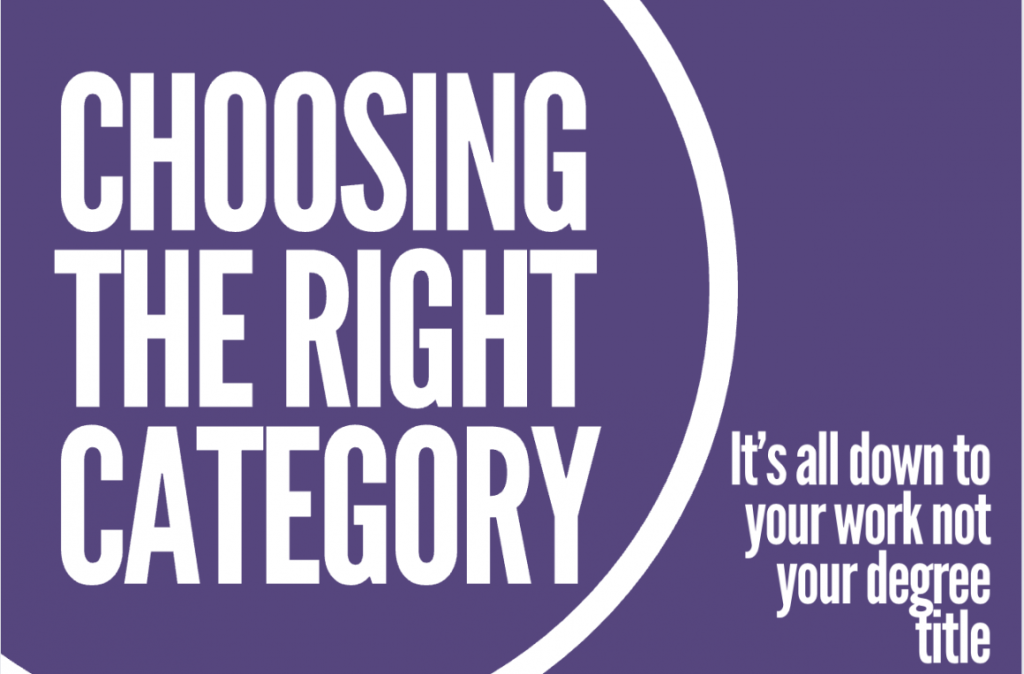GUA News: Choosing the Right Category
A Guide to Submitting Your Work to the correct Category based on Your Work not just your Degree Title
May 3, 2025
by Grace McCabe-Palmer

When submitting your work to the Global Undergraduate Awards one of the most important—and sometimes confusing—decisions you’ll make is selecting the right category for your piece of work. A common misconception is that your submission must align with your degree title. In fact, the category should match the content of the individual paper, not your broader field of study.
This can also be an issue if you scroll through the categories and none of them seem to match your degree exactly. Do not worry. This is more common than you might think, and it does not mean you cannot enter.
However, this distinction is essential to ensuring your work is assessed by the right experts as each category is judged by a panel of academics and professionals who specialise in that specific area, and they are looking for depth, insight and a clear contribution to the field their category represents.
So, how do you decide which category is right?
Let’s break it down with a few examples:
Scenario 1: A Politics Student Writing on Education
Imagine you’re studying Politics and you’ve written a paper on programmes of re-education. If your analysis is primarily political — focusing on policy, governance or international implications — then Politics & International Relations is the appropriate category. However, if your work delves into pedagogical theories, educational frameworks or teaching methodologies, Education might be a better fit.
Scenario 2: A Business Paper with Political Implications
Suppose you’ve written a paper that applies economic theories or business strategies to explain a political phenomenon. If the primary lens is through business or economics—e.g., cost-benefit analysis, market behaviour or fiscal policy—then Business & Economics is the way to go. But if your paper only briefly references business concepts while focusing on international relations or political theory, then it belongs in Politics & International Relations.
The Key Rule: Follow the Content, Not just the Degree
The route to the right category lies in the core concepts your paper engages with. Ask yourself:
- What field of study does my argument contribute to?
- Which academic community would benefit most from this analysis?
- What discipline’s tools and theories am I primarily using?
Not sure? Get a second opinion
Still undecided? Speak to your lecturer, tutor or supervisor. They are often best placed to help you understand how your work sits within the wider academic field. Many students also find it helpful to discuss their choice with coursemates or students on other pathways who are familiar with the topics you are discussing in your work.
You can also read through the full list of categories and descriptions on the GUA website. These short overviews give you a sense of what each category covers and will help you match your work more confidently.
Need a hand? Just ask us
If you have considered the options and you are still unsure, that’s okay. We are here to help. You can contact the GUA team here or ask our virtual assistant (bottom right on the category listing page). Just tell us the subject, title and your abstract or outline (need a hand with your abstract we have broken this down too), and we will do our best to guide you towards the most suitable category.
A few things to keep in mind
- You can submit up to three different pieces of coursework
- Each piece of work can be submitted to the same OR different categories. Note: you can’t submit the same piece of work to different categories
- Choose the category that best reflects the nature of that particular work.
- The judges will be assessing the quality of the submission within the context of the category you choose, so it is important to make sure your entry aligns with that academic field.
Final Advice
Your paper will be read and evaluated by expert judges chosen for their knowledge of the category you select. Submitting to the wrong category might mean your work is assessed outside of its intended context, which can impact how it’s understood and valued and ultimately awarded – or not!
Take the time to reflect on the essence of your paper. If you’re unsure, discuss your options with someone you can trust but remember—you know your work best. Your decision will help ensure that your submission receives the attention and appreciation it deserves.